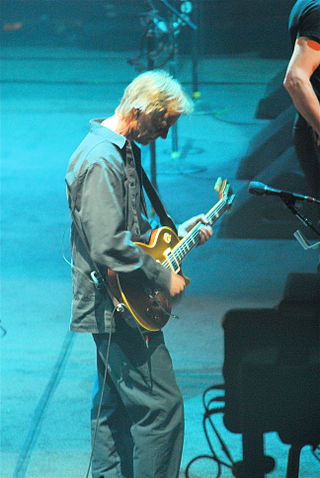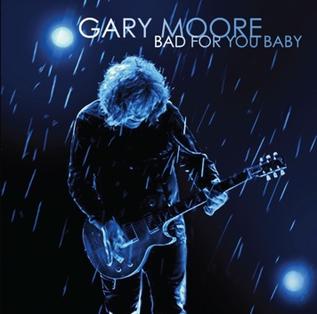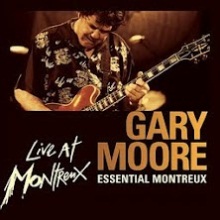
Funk is a music genre that originated in African-American communities in the mid-1960s when musicians created a rhythmic, danceable new form of music through a mixture of various music genres that were popular among African-Americans in the mid-20th century. It deemphasizes melody and chord progressions and focuses on a strong rhythmic groove of a bassline played by an electric bassist and a drum part played by a percussionist, often at slower tempos than other popular music. Funk typically consists of a complex percussive groove with rhythm instruments playing interlocking grooves that create a "hypnotic" and "danceable" feel. It uses the same richly colored extended chords found in bebop jazz, such as minor chords with added sevenths and elevenths, and dominant seventh chords with altered ninths and thirteenths.

William Earl "Bootsy" Collins is an American bass guitarist, singer, and songwriter. Rising to prominence with James Brown in the early 1970s before joining the Parliament-Funkadelic collective, Collins established himself as one of the leading names and innovators in funk with his driving basslines and humorous vocals. He later formed his own P-Funk side project known as 'Bootsy's Rubber Band'. He was a frequent collaborator with other musicians from a variety of genres, including dance music, electronic big beat, and alternative metal (Praxis), among others. He is a member of the Rock and Roll Hall of Fame, inducted in 1997 with 15 other members of Parliament-Funkadelic. In 2020, Rolling Stone magazine ranked Collins number 4 in its list of the 50 greatest bassists of all time.
Electric blues is blues music distinguished by the use of electric amplification for musical instruments. The guitar was the first instrument to be popularly amplified and used by early pioneers T-Bone Walker in the late 1930s and John Lee Hooker and Muddy Waters in the 1940s. Their styles developed into West Coast blues, Detroit blues, and post-World War II Chicago blues, which differed from earlier, predominantly acoustic-style blues. By the early 1950s, Little Walter was a featured soloist on blues harmonica using a small hand-held microphone fed into a guitar amplifier. Although it took a little longer, the electric bass guitar gradually replaced the stand-up bass by the early 1960s. Keyboards, especially electric organs and electric pianos, later became widely used in electric blues.

Robert William Gary Moore was a Northern Irish musician. Over the course of his career, he played in various groups and performed a range of music including blues, blues rock, hard rock, heavy metal and jazz fusion.

Kingdom Come is a Germany-based hard rock band formed in 1987. The band was originally fronted by Lenny Wolf, until their hiatus in 2016. While there have been no constant Kingdom Come members throughout the band's history, their most recent lineup features three original members who, along with drummer James Kottak, left the band in 1989 and returned in 2018. Wolf was replaced by Keith St. John in 2018, and he remained until 2024, when Ezekiel "Zeke" Kaplan replaced him. Kottak remained in Kingdom Come until his death in January of the same year and was replaced by Matt Muckle. The band's 1988 debut album, Kingdom Come, is to date their most internationally popular and biggest selling recording and features their most notable hit "Get It On".
Blues rock is a fusion genre and form of rock music that relies on the chords/scales and instrumental improvisation of blues. It is mostly an electric ensemble-style music with instrumentation similar to electric blues and rock. From its beginnings in the early to mid-1960s, blues rock has gone through several stylistic shifts and along the way it inspired and influenced hard rock, Southern rock, and early heavy metal.

Terence Charles "Snowy" White is an English guitarist, known for having played with Thin Lizzy and with Pink Floyd, and more recently for Roger Waters' band. He is also known for his 1983 single "Bird of Paradise", which became a UK Singles Chart Top 10 hit single.

Band of Gypsys is a live album by Jimi Hendrix and the first without his original group, the Jimi Hendrix Experience. It was recorded on January 1, 1970, at the Fillmore East in New York City with R&B musicians Billy Cox on bass and Buddy Miles on drums, a grouping frequently referred to as the Band of Gypsys. The album mixes funk and R&B elements with Hendrix's psychedelic rock guitar and wah pedal-based jamming, an approach which later became the basis of funk rock. It contains previously unreleased songs and was the last full-length Hendrix album released before his death six months later.

Robert John Daisley is an Australian musician and songwriter. A bassist, he is perhaps best known for his intermittent relationship with vocalist Ozzy Osbourne, for whom he contributed bass, co-production and songwriting throughout the 1980s. Daisley has also worked with prominent rock acts including Black Sabbath, Rainbow, Gary Moore, Chicken Shack and Uriah Heep, among others. In 2013, he published his autobiography entitled For Facts Sake which has received outstanding reviews.

"Shapes of Things" is a song by the English rock group the Yardbirds. With its Eastern-sounding, feedback-laden guitar solo and environmentalist, antiwar lyrics, several music writers have identified it as the first popular psychedelic rock song. It is built on musical elements contributed by several group members in three different recording studios in the US, and was the first Yardbirds composition to become a chart hit; when released as a single on 25 February 1966, the song reached number three in the UK and number eleven in the US.

Still Got the Blues is the eighth solo studio album by Northern Irish guitarist Gary Moore, released in March 1990. It marked a substantial change in style for Moore, who had been predominantly known for rock and hard rock music with Skid Row, Thin Lizzy, G-Force, Greg Lake and during his own extensive solo career, as well as his jazz fusion work with Colosseum II. As indicated by its title, Still Got the Blues saw him delve into an electric blues style.

Grinding Stone is the only studio album by The Gary Moore Band. Released in 1973, it was recorded between Moore's leaving Skid Row and joining Thin Lizzy.

Dark Days in Paradise is the eleventh solo studio album by Irish guitarist Gary Moore, released by Virgin Records on 26 May 1997. It represented a stark change in musical direction for Moore, eschewing the blues and blues rock stylings of his preceding albums in favour of a more contemporary sound. Moore produced the album with Chris Tsangarides and was joined in the recording by musicians such as Gary Pratt, Gary Husband and Magnus Fiennes.

Twisted Brown Trucker is the backing band for American musician Kid Rock. Formed in 1994, the band has contributed to nine of his twelve studio albums, as well as Uncle Kracker's Double Wide album.

Eric Gales, also known as Raw Dawg, is an American blues rock guitarist, originally hailed as a child prodigy. As of 2022, Gales has recorded nineteen albums for major record labels and has done session and tribute work. He has also contributed vocals on several records by the Memphis rap groups Prophet Posse and Three 6 Mafia under the names Lil E and Mack E.

Gwyn Ashton is a Welsh–Australian blues, rock guitarist and singer-songwriter. He has released ten albums and toured Australia, Europe and North America.

Bad for You Baby is the seventeenth solo album by Northern Irish blues guitarist and singer-songwriter Gary Moore, the last album to be released in his lifetime, and the last album until 2021's How Blue Can You Get.

Live at Montreux 2010 is a live album and Blu-ray/DVD by the Northern Irish, blues rock guitarist and singer, Gary Moore. It was recorded at the Montreux Jazz Festival on 6 July 2010, and released on 19 September 2011. This would prove to be Gary Moore's last filmed performance before his death on 6 February 2011.

Essential Montreux is a special edition, five CD box-set, by Northern Irish, blues rock guitarist and singer, Gary Moore. The box-set features five out of the six performances Gary Moore made at the Montreux Jazz Festival. His live performances at Montreux that feature in this box-set are Live at Montreux 1990, 1995, 1997, 1999 and 2001.

Blues for Jimi is a live album and video by the Northern Irish, blues rock guitarist and singer, Gary Moore. The live performance was originally recorded on 25 October 2007 at the London Hippodrome.




















